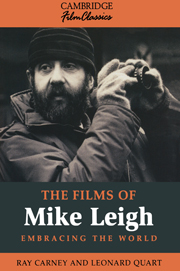Book contents
- Frontmatter
- Contents
- Editorial Note
- Acknowledgments
- Biographical and Cultural Introduction
- 1 Stylistic Introduction: Living beyond Consciousness
- 2 Fictitious Selves: Bleak Moments
- 3 Personal Freezing and Stylistic Melting: Hard Labour
- 4 Existence without Essences: The Kiss of Death
- 5 Defeating Systems of Knowing: Nuts in May
- 6 Losing Track of Who You Are: Abigail's Party
- 7 We Are the Hollow Men: Who's Who
- 8 Inhabiting Otherness: Grown-Ups
- 9 Manufactured Emotions: Home Sweet Home
- 10 Challenging Easy Understandings: Meantime
- 11 Holding Experience Loosely: High Hopes
- 12 Circulation Is the Law of Life: Life Is Sweet
- 13 Desperate Lives: Naked
- Epilogue: The Feel of Life
- Notes
- Filmography
- Bibliography
- Index
10 - Challenging Easy Understandings: Meantime
Published online by Cambridge University Press: 05 June 2012
- Frontmatter
- Contents
- Editorial Note
- Acknowledgments
- Biographical and Cultural Introduction
- 1 Stylistic Introduction: Living beyond Consciousness
- 2 Fictitious Selves: Bleak Moments
- 3 Personal Freezing and Stylistic Melting: Hard Labour
- 4 Existence without Essences: The Kiss of Death
- 5 Defeating Systems of Knowing: Nuts in May
- 6 Losing Track of Who You Are: Abigail's Party
- 7 We Are the Hollow Men: Who's Who
- 8 Inhabiting Otherness: Grown-Ups
- 9 Manufactured Emotions: Home Sweet Home
- 10 Challenging Easy Understandings: Meantime
- 11 Holding Experience Loosely: High Hopes
- 12 Circulation Is the Law of Life: Life Is Sweet
- 13 Desperate Lives: Naked
- Epilogue: The Feel of Life
- Notes
- Filmography
- Bibliography
- Index
Summary
At its simplest, things happen in the improvisations which I then structure, and that's the end product. But mostly that's not the case: Mostly what I do is to challenge what's happened and thus arrive at a more interesting dramatic essence.
–Mike LeighMany writers on film have a mistaken notion of art. They think it presents experiences packed tight with compressed meaningfulness, just sitting there waiting to be unpacked by the diligent critic. In the standard critical demonstrations, the greatness of Citizen Kane, Vertigo, or 2001 is that virtually every lighting effect, camera angle, or prop is freighted with interlocking significance. Criticism is the act of translating those stylistic details into an intricate series of significations. The critic exhumes the sermons the artist has artfully hidden under his stones. In this view, both creation and interpretation are acts of mastery – Faustian enterprises in which the artist operates from a position of ultimate knowingness that the critic and viewer aspire to equal.
Of course, there are films that are organized in this way and yield to this kind of critical scrutiny – Hitchcock's work leaps to mind as an extended example, but that doesn't change the fact that it is a gameplaying, puzzle-solving notion of art, that could probably only have come to the fore in a field as immature as film study. If we look at truly great works of art we find something quite different.
- Type
- Chapter
- Information
- The Films of Mike Leigh , pp. 163 - 178Publisher: Cambridge University PressPrint publication year: 2000



